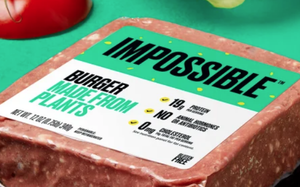
As the financial, political and public
relations competition between animal meat and plant-based meat substitutes heats up, new research suggests that price and taste are two main drivers of plant-based product consumption.
The
same research shows that the #1 reason that people said they tried plant-based meat products was curiosity about taste — not principle-based motives such as environmental concern, health or
animal welfare. However, principles rose to the top among repeat purchasers/loyal users.
UBS Evidence Lab surveyed some 3,000 consumers and found that at 8%, trial consumption of plant-based
burgers in the United States lags behind that of Germany and the U.K., both in the mid-20% range.
“Survey data show 73% of interested buyers rank taste curiosity as their top reason to
try” plant-based meats, whereas loyalists cite health perceptions and environmental concern,” the report concludes.
advertisement
advertisement
And after satisfying that taste curiosity “more consumers
believe that the taste profile of plant-based meat products is presently less preferred than animal-based meat products.”
Beyond taste, top purchase considerations for plant-based meat
products were health perceptions (#2), animal welfare (#3) and the quality of being resource-friendly (#4). But among survey respondents who planned to increase their consumption over the next six
months, health perceptions was the #1 reason.
Among the respondents who have avoided plant-based meats, taste perception was the #1 reason followed by “respondent belief that plant-based
meat is heavily processed relative to animal-based meat product lines.”
According to the U.S. Department of Agriculture, Americans’ per-capita consumption of red meat and poultry
rose to 220 pounds in 2018, from 167 pounds in 1960. An co-dependent system consisting of farms, feed lots and slaughterhouses delivers tens of millions of cows and pigs each year to consumers via
grocers and restaurants.
Having seen the impact of plant-based alternatives on the milk industry, this ecosystem is fighting back, as chronicled last week by the Wall Street Journal. Beef
producers are leveraging food scientists, lobbyists and even voice activation on Google and Amazon devices when people have questions about meat. One example: “The best alternative to
beef is more beef.”
And plant-based meat providers are looking beyond the 6% of Americans who are vegan to attract so-called “flexitarian” eaters who might be environmentally
friendly enough to give their burgers or nuggets a try. Some early entrants like Impossible Foods started with distribution exclusively via quick-serve restaurants, where plant-based meat is priced at
a smaller premium than in the retail channel, according to UBS.
Meanwhile, Beyond Meat chose retail over QSR before it began supplying Dunkin’ Donuts with a plant-based breakfast sausage
this year. Retail plant-based meat offerings carry a significant price premium, according to UBS, with the average retail selling price for an eight-ounce Beyond Meat burger patty pegged at
$5.58—nearly 2.5 times that of a comparable Tyson animal beef patty.
UBS describes the typical plant-based meat consumer as female, age 55+, “high income, suburban and
Caucasian.” To entice non-adopters, particularly males and consumers with lower incomes, the research recommends an “improved taste profile” and/or a “lower price
point.”
Cost is still a major stumbling block for companies pursuing the production of lab-grown meats using animal cells. UBS says that the first lab-grown meat from Memphis Meats cost
$18,000 per pound, but by January of 2018 that had been reduced to $2,400.
Research from CB Insights describes such “high-tech” meats as being priced “as luxury goods,”
with a major cost factor being the presence of fetal bovine serum, which is extracted from cow fetuses.
“However, startups are looking to eliminate FBS from the meatless equation in
order to cut costs,” CB notes.